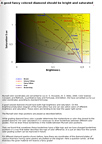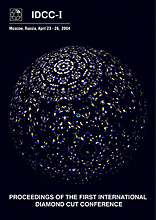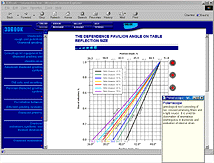|
IV Gemological Symposium, San Diego, Ca, USA, 27-30 Aug, 2006
 Poster prezentation Study of Interdependence: Fancy-color Diamond Appearance, Cut, and Lighting Conditions Poster prezentation Study of Interdependence: Fancy-color Diamond Appearance, Cut, and Lighting Conditions
Oral Prezentation Fancy-Color Diamonds: Better Color Appearance by Optimizing Cut
1st International Diamond Cut Conference, Moscow,
Russia, 23 - 26 april, 2004
 The materials of the conference: The materials of the conference:
IDCC-I:
Diamond Cut Grading System based on 3D model. A Strategy
for Development. S.B. Sivovolenko, Yu.B. Shelementyev, April 2004
IDCC-I:
The Stages of Development and Implementation of a Diamond
Cut Grading System. S.B. Sivovolenko, Yu.B. Shelementyev, April 2004
IDCC-I: Poster Session, April 2004
IDCC-I: Cover of the Proceedings
IDCC-I
Home Page
Diamond Cut Study Project
How studying the cut parameters of a diamond can help a manufacturer to increase the efficiency of his work and allow a dealer and jeweler to increase the price and liquidity of the diamond?
 We suppose that to efficiently solve this problem we need to perform some mathematical calculations, discuss the obtained results with manufacturers, dealers and jewelers, and let them test the validity of the calculations in practice. We invite all the interested people and organizations to discuss and employ the results of our studies. We suppose that to efficiently solve this problem we need to perform some mathematical calculations, discuss the obtained results with manufacturers, dealers and jewelers, and let them test the validity of the calculations in practice. We invite all the interested people and organizations to discuss and employ the results of our studies.
At the moment, we confine ourselves to studying the round brilliant cut of diamonds for the purpose of finding the best tradeoff in the simultaneous optimization of the light return, fire, and weight of a diamond. Here we propose to discuss our first results obtained on this way. These results can be divided into "Macroanalysis" and "Microanalysis" sections.
The Macroanalysis involves tracking all possible angles and proportions and determining the regions promising for cutting, from the point of view of either light return or fire. At this stage, we not only confirm the conventional sets of cut parameters but also find out some new, unusual configurations.
The Microanalysis involves the detailed studies of the narrow range of cut parameters: the crown angle - from 30° to 40°, the pavilion angle - from 38° to 43°, and the table size - from 52% to 60%. The cut parameters thus determined optimize the light return and fire of a diamond. By cutting the diamond using these parameters as a guideline, it is possible to improve the appearance of the diamond without breaking conventional proportions.
The some of Cut Study articles:
 |
The History of Diamond Cut Studies
There are several scientific articles regarding cut study
posted here. All interested visitors can trace the evolution
of cut study methods and approaches. Authors of articles
posted below can have opinions different form ours.
 |
The
"Diamond Design" by Tolkowsky 1919 (part) |
 |
"Faceting
Limits" by Bruce Harding, 1975 |
 |
"
"Diamond Design" Revisited" by Bruce Harding |
 |
"A
statistical assessment of brilliance and fire for the
round brilliant cut diamond" by J.S.Dodson, 1978 |
 |
"Selection
of facet slopes" by A.V.Vasiliev, 1995 |
 |
"Rainbow
in a Colorless Gem" by A.V.Vasiliev, 1995 |
 |
"Cutting Grades Two Years Off" by Russell Shor, GemKey |
 |
"Diamond Grading Reports: Flawless or Imperfect ?", Russell Shor (JCK senior editor) (this article appeared in the July 1995 issue of JCK) |
 |
The
Results of Diamond Cut Studies Carried out in MSU, 1999 |
 |
Developing
of Diamond Cut Grading System by MSU Computer Tools |
 |
Determination
of the cut quality of a diamond and visual evaluation of its
beauty |
 |
On the problem of grading the quality of diamond cut: an analysis of some aspects of the problem, March 2002 |
 |
The Optical Design of Gemstones, by Jose M. Sasian, Peter Yantzer and Tom Tivol, 2003 |
 |
On grading the symmetry of round brilliant cut diamonds, S.B. Sivovolenko, Yu.B. Shelementyev and Garry Holloway, 2003 |
 |
OctoNus brilliance beauty research: test with real diamonds, 2003 |
 |
Study of Interdependence: Fancy-color Diamond Appearance, Cut, and Lighting Conditions, S.B. Sivovolenko, Yu.B. Shelementyev, 2006 |
 |
Fancy-Color Diamonds: Better Color Appearance by Optimizing Cut, S.B. Sivovolenko, Yu.B. Shelementyev, 2006 |
 |
Visible adsorption spectra and DiamCalc-files of colored gem materials, S.B. Sivovolenko, Yu.B. Shelementyev and R. Serov, 2007 |
 |
Letter to the Editor of the Australian Gemmologist, The Cut Group, 2007 |
 |
Evaluation of brilliance, fire, and scintillation in
round brilliant gemstones, Jose Sasian, Jason Quick, Jacob Sheffield, James Caudill and Peter Yantzer, 2007 |
 |
Letter to the Editor - Commoditization of Diamonds, The Cut Group, 2007 |
 |
Letter to the Editor - Synthetic Appeal, The Cut Group, 2008 |
 |
How diamond performance attributes: Brilliance, Scintillation and Fire depend on human vision features - The Australian Gemmologist, 2013 |
|
OctoNus Diamond Cut Initiative
Laboratories Cut Estimation

Hearts and Arrows: Objectively Measured and Certified
Hearts and Arrows: Introduction Guidelines
Hearts and Arrows:
Objectively measured and certified
Hearts and Arrows:
Relationship with the cut parameters
Hearts and Arrows:
Lighting specification
AGS & GIA
AGS & GIA
GIA & AGSPGS Charts
GIA, AGS GOLD 2008 & AGSPGS Charts
AGS GOLD 2008 & AGSPGS Chart for Table 57%
Master Stone Set Project
Diamond 3DBook - interactive diamond traning course
|
 Diamond 3DBook is a computer tutorial
that involves extensive information on working with diamonds: from
the physical background determining the unique properties of these
stones to the modern worldwide system of diamond trade. Diamond 3DBook is a computer tutorial
that involves extensive information on working with diamonds: from
the physical background determining the unique properties of these
stones to the modern worldwide system of diamond trade.
3DBook is designed for training diamond specialists and raising the level of
their skills. The capability of interactive diamond modeling and the
availability of extensive reference data make Diamond 3D Book a useful
tool in everyday work of gemologists, appraisers, Certification Centers,
gemstone cutters, gemological labs and institutes, manufacturers and
sellers of diamonds and jewelry made of these.
|
|




















